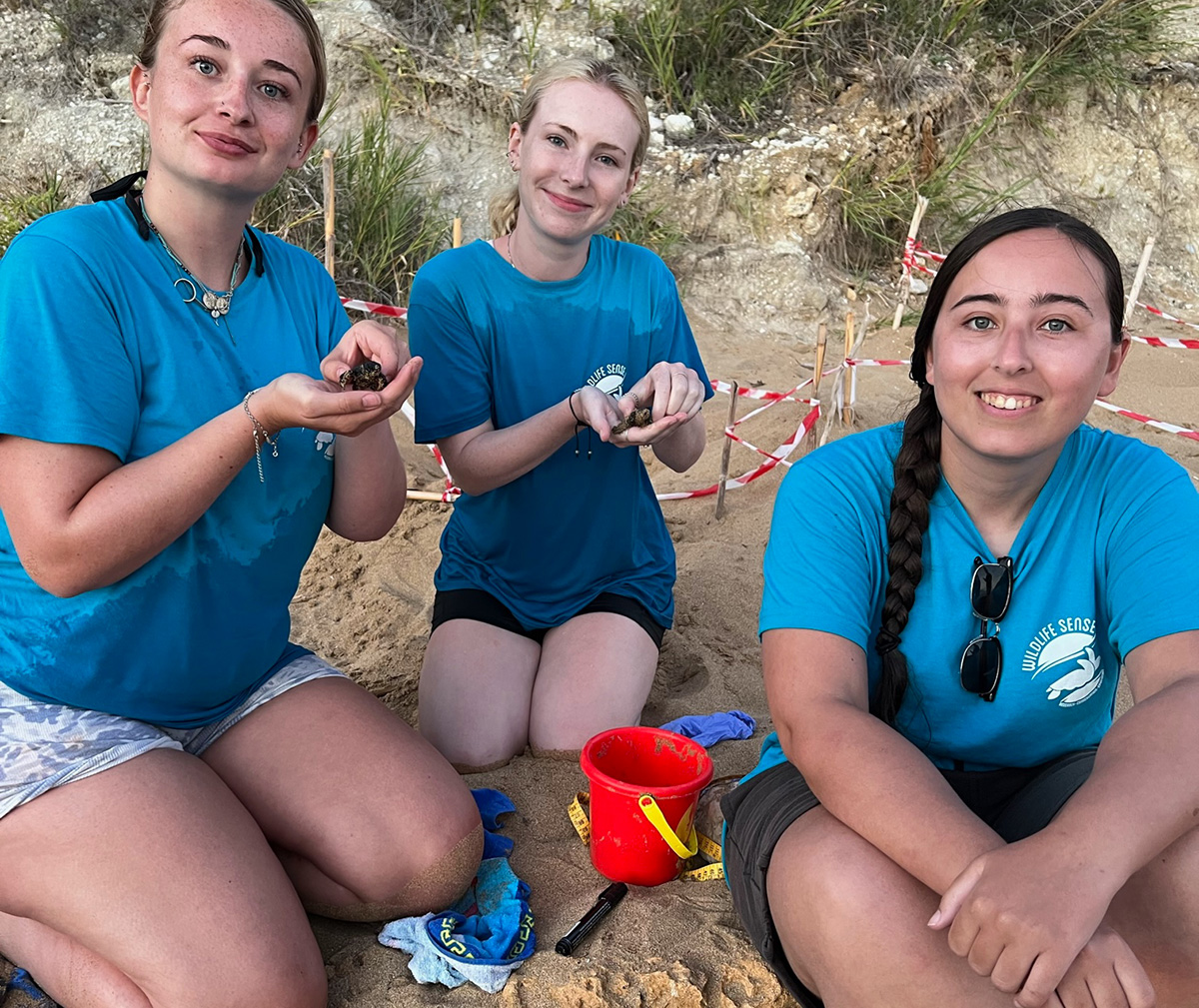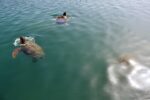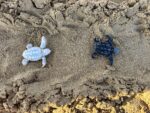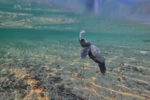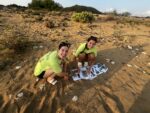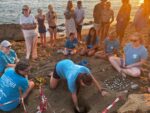September 5 Hatching 2022 News
Argostoli Field Station
Beach – Hatching
This week we saw our first hatchlings on Cape St Nicks, a beach that we usually survey with a drone rather than visiting every day due to the difficult nature of reaching this beach. Cape St Nicks is unfortunately a beach which is affected by light pollution, however, as it is difficult to reach we do not protect these nests using hatchling rescue. Instead, we provide shading around the nests on this beach when they are due to hatch to ensure the hatchlings go towards the natural light of the moon rather than towards the anthropogenic lights. We found that the shading proved to be very successful as all hatchling tracks that were found headed straight towards the sea. We inventoried our first nest on this beach after seeing a mass hatching event and found that an amazing 113 out of 114 eggs were hatched! This was an amazing 99.12% success rate, and we hope to see these results on the other two nests currently on this beach!
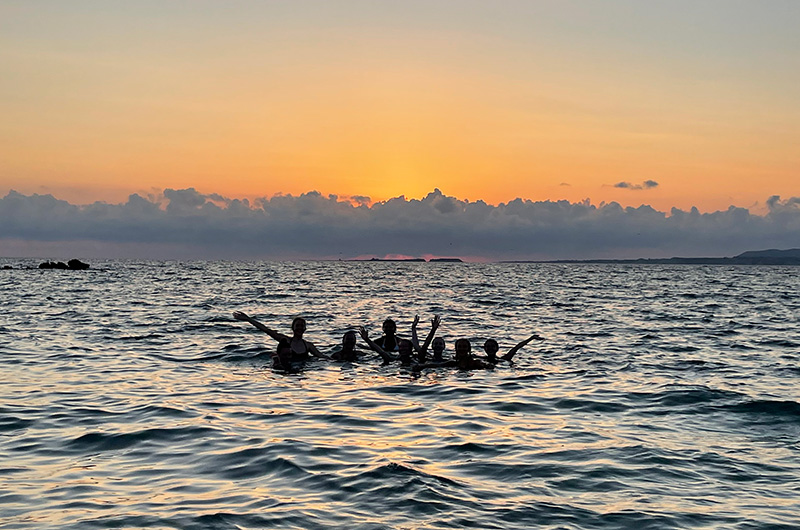
We also had an exciting mass hatchling during one of our hatchling rescue shifts on Megali Ammos this week. Our volunteers saw 85 hatchings safely make it to sea. This number is so important to us as Megali Ammos is another beach with lots of light pollution. Without our nightly hatchling rescue shifts, a lot of hatchlings could get lost and disorientated and go back up the beach if they confuse the lights with the natural light of the moon. The hatching events this week have been really exciting but also highlight the importance of preventing light pollution in order to get as many hatchlings to sea as possible. We are so grateful to all of our volunteers for pushing through the nights with such positivity and helping to contribute to our vital work.
Harbour
This week has been an extremely busy week in terms of turtle activity in the harbour. As usual, our amazing volunteers have been out and about collecting data on turtle foraging and interaction.
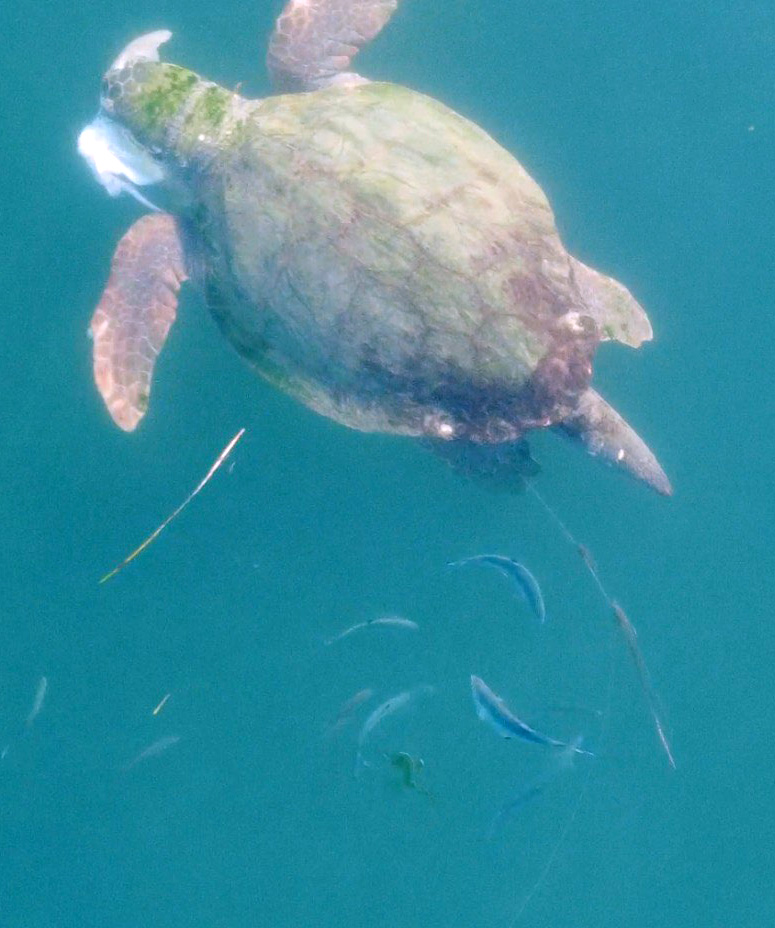
However, last Sunday, a harbour regular Phoebe was seen swimming with a line dragging behind her. Acting quickly, a rescue team rushed to the harbour with the aim to catch her and free her from the line. Once caught, it was clear that it wasn’t just a line on Phoebe’s flipper but also a hook lodged in one of the front flippers as well. The hook was not one from professional fishing but from recreational fishing, which is, in fact, illegal in our beautiful harbour. Thankfully, the rescue team were able to free Phoebe with no complications and she has been seen in the harbour swimming well and looking healthy. Phoebe’s scare highlights the dangers of fishing for Loggerhead turtles, causing many to be injured or killed by hooks and fishing nets. The lines of recreational fishing can get caught on flippers which can tighten over time and cause restriction of blood, and eventually lead to amputation. We are so glad that this was not the case for Phoebe and that the line was removed quickly and that she is doing well! A few days later another of our harbour regulars, Ziba was spotted with a line trailing behind him. Once we had caught Ziba we could see that the line had luckily come away by itself and there was no sign of any hooks and Ziba was released.
Volunteer activities
The beginning of the week saw a brand new changeover with lots of new faces coming to join us in helping the sea turtles of Kefalonia. Everyone got stuck in really quickly with learning about the importance of our work. But, it was not all work with lots of play too. After our beach profile and sand sifting demonstrations, some of our volunteers enjoyed a sunset swim and a game of rounders. We have also had some amazing games of volleyball, a henna night and a quiz night after a busy day of collecting vital data and nest checking. We also had a smores night at the start of the week which meant lots of great snacks and a great chance for our volunteers to get to know one another.
Overall, we had a really fun week and look forward to a new week of, hopefully, lots of successful hatchings as well as a fun week of activities with our volunteers as we approach the end of their time with us.
Written by Emily Simpson
Lixouri Field Station
As the weeks pass by here in Lixouri, our nests are hatching ten to the dozen. Over the past week alone, we have had eight first hatchings of nests across all three of our survey areas: Lepeda, Megas Lakkos, and Vatsa. One of these first hatchings includes a nest from which our vigilant volunteers spotted six hatchlings making their way to the sea upon a morning survey. Including these six hatchlings going to sea, there were a total of 21 hatchlings that made their way to sea safely, which was calculated from the number of pre-existing tracks in the sand. Moments like these never get old here at Wildlife Sense, no matter how many hatchlings we come across, every single one of them is equally as valuable.
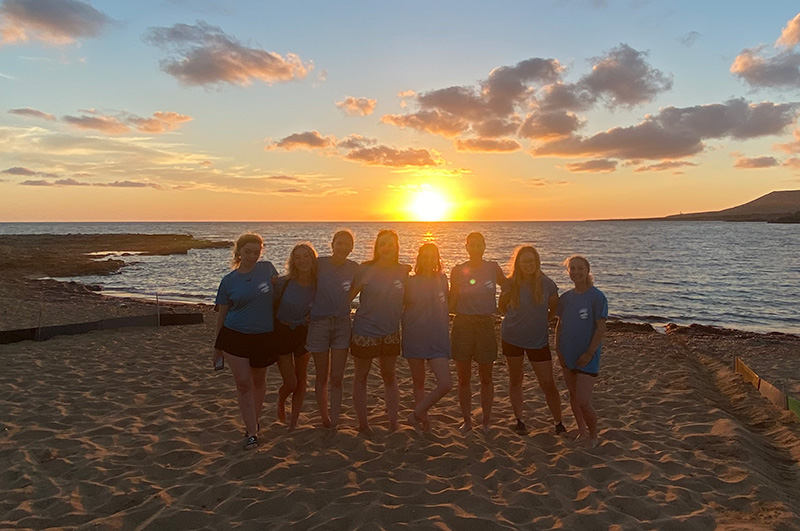
Alongside counting hatchling tracks and ensuring everyone leads directly to the sea without any misorientation or disorientation, predominantly caused by anthropogenic light pollution such as streetlamps, houses, and beach bars, morning survey teams had their work cut out for them during a recent storm. Thankfully, the severity of the storm wasn’t strong enough to result in any nests becoming inundated and therefore requiring an emergency relocation, which is what occurred following our previous storm. Despite there being no inundations, our hard-working team tirelessly massaged the surface of each nest to prevent the sand from hardening and potentially trapping hatchlings underneath.
Our last remaining nest on Lepeda, LG3R, had its first hatchings on day 44, one day earlier than expected for its first possible hatching. Thankfully our eagle-eyed team on morning survey were able to spot these tracks and figure out the direction in which they headed. Due to the current status of this nest being partially inventoried, we can soon expect to round up hatchling rescue shifts on Lepeda for another season. Hatchling rescue shifts are not completely out of the picture yet, however, as our last nest on Capenwill require this shift due to risks related to predation, rather than light pollution. Linking to light pollution, we have recently placed extra shadings around nests that are close to any source of artificial light, which could potentially cause disorientation.
Just as quickly as nests are starting to hatch, they are also being finished off. Another 8 of our nests completed hatching this week, leaving us with only 25 nests and bringing us closer to the end of the season. These nests have had varying levels of success, which could be due to several factors including location, beach conditions, and the nesting female who laid the clutch. The average success rate for our nests is around 80%, however, we have nests that are both more and less successful than this. A nest on Vrahanari had a success rate of 90% with 70 hatched eggs, despite having only begun to hatch two nights previously. A nest on Vatsa, on the other hand, had a much lower success of only 7%. When inventorying the nest on Vatsa we found lots of pink bacteria within the eggs, this can bacteria can be transferred to the eggs from the mother turtle’s cloaca and likely contributed to the low success of this nest. This is the fifth nest on Vatsa which has had pink bacteria.
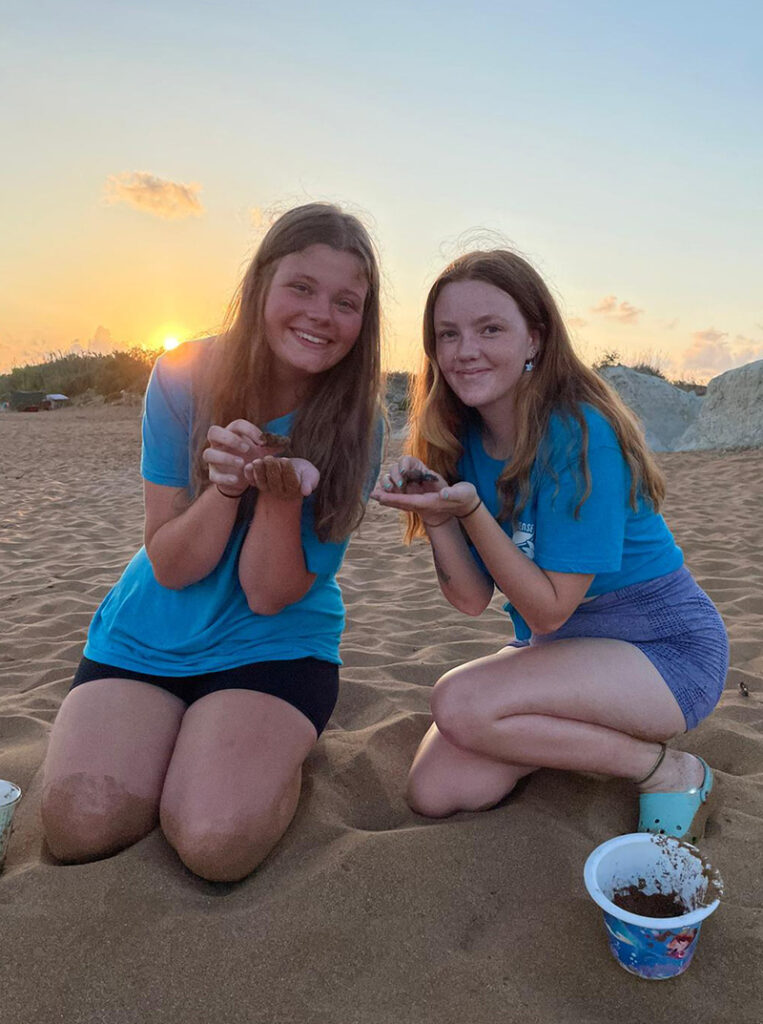
Despite the low success of that Vatsa nest, two hatchlings were found alive within the egg chamber, and, after crawling 12m along a trench to imprint the location of the beach, made it to sea. The hatchlings were below numerous non-viable eggs, meaning that they would have struggled to get out of the nest unassisted, illustrating the importance of conducting inventories.
Hatchlings were also helped to sea on many of our other inventories, most notably including 15 hatchlings from a nest on Megas Lakkos and 23 hatchlings from a partial inventory on a nest laid on Loggos. We are still keeping our eye out for tracks from nesting females, however, with the last emergence being 4 weeks ago therefore we have likely seen the last nest for this season.
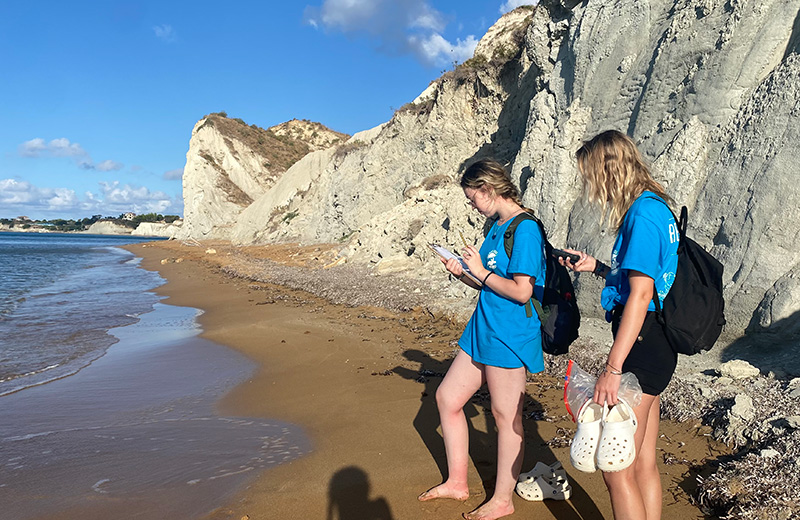
Our new volunteers have settled in well and have been doing amazing work looking out for and counting tracks on morning survey. Currently, we have 8 nests that are hatching, and 4 more that have hit their 45 days and could begin hatching any day now. With more nests due to hit their 45-day incubation period in the coming days, we are looking forwards to a busy week in Lixouri with hopefully lots of hatchlings making it to sea.
Written by Mia Holman and Kathryn Skazick
Skala Field Station
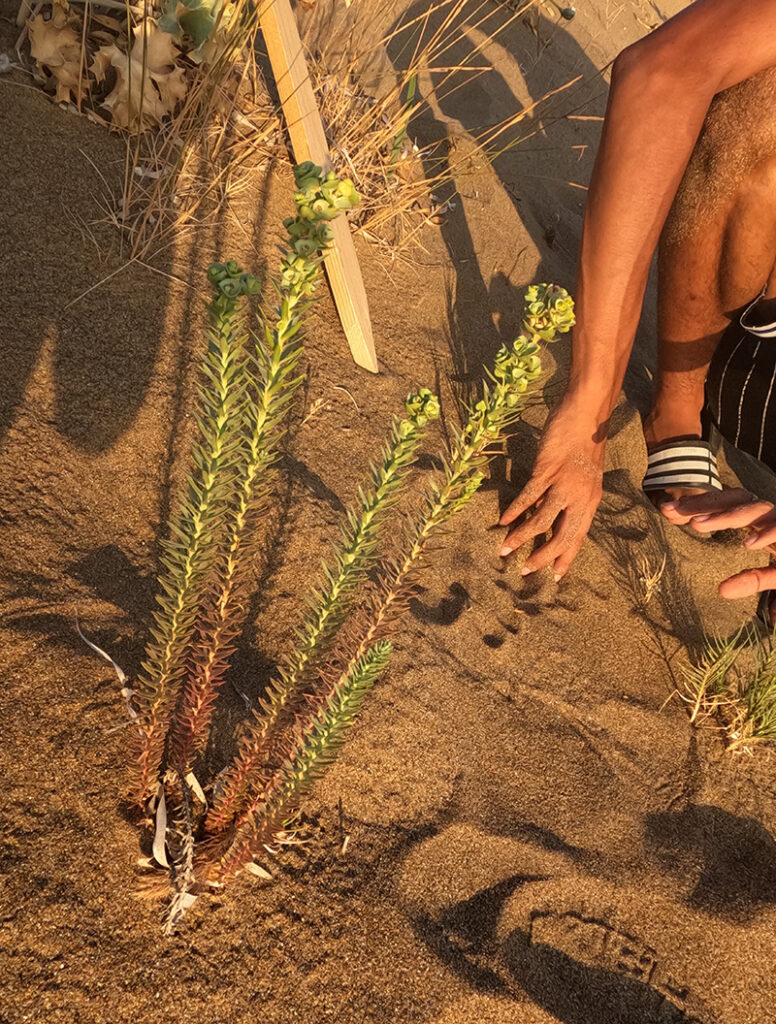
This week we say goodbye to two interns who spent the summer with us. We enjoyed the last evening with them in our favourite restaurant where the group had the opportunity to taste many Greek specialities such as Moussaka or Kefalonian meat pie. We would like to thank these two interns for all the work they have done this summer, we will miss them. However, the program continues and this week we welcome our seventh group of volunteers. For these two weeks, we have a great mix of nationalities, within the group, we represent Italy, France, Switzerland, Germany, Greece and the UK.
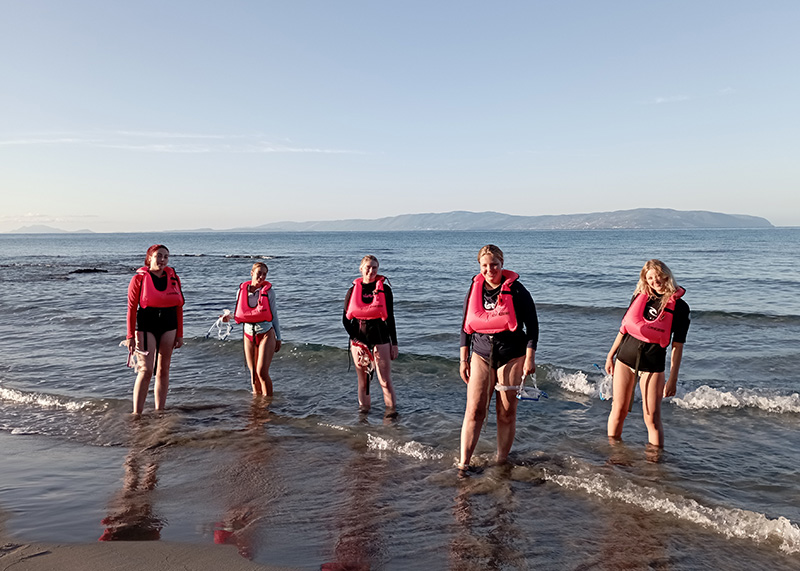
Our new volunteers have already completed the training! The swim test has been postponed due to the weather conditions. Indeed, the weather is unpredictable on the island now that it is September! Finally, the swim test was completed on Sunday.
More good news: the map made with the drone in Skala is finished! Now our drone survey consists in going back to the same location to compare the different images. We also added a new plant to our plant Key: the Giant Reed. This one has been seen many times in the sand dunes and has been hard to identify !! On one of their last evening sand dune surveys, the last group also observed a plant that we had never seen before and now we are looking forward to identifying it.
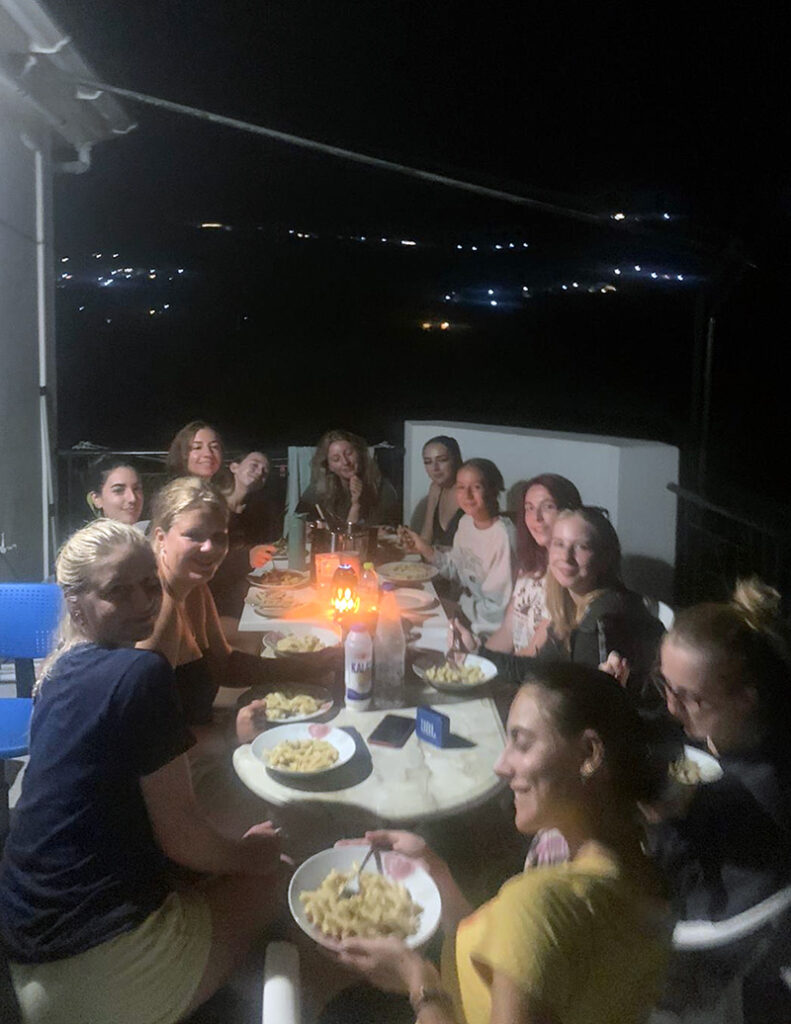
Now that the swim practice is done, we can’t wait to start the snorkelling surveys with our new group of volunteers to collect more data!
Written by Julie Mollies

